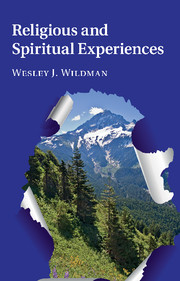Book contents
- Frontmatter
- Contents
- List of figures
- Preface
- Acknowledgements
- 1 Exploring a strange yet familiar landscape: a strategy for interpreting religious and spiritual experiences
- 2 Spirituality and the brain: a revolutionary scientific approach to religious and spiritual experiences
- 3 A smorgasbord of dangers and delights: the phenomenology of religious and spiritual experiences
- 4 Gateway to ultimacy: the importance of intense experiences
- 5 Can you trust your instincts? The cognitive reliability of religious and spiritual experiences
- 6 The brain-group nexus: the social power of religious and spiritual experiences
- 7 Make it start, make it stop! Religious and spiritual experiences in the future
- 8 Brains in bodies, persons in groups, and religion in nature: an integrative interpretation of religious and spiritual experiences
- Glossary of key terms
- References
- Index
6 - The brain-group nexus: the social power of religious and spiritual experiences
Published online by Cambridge University Press: 04 February 2011
- Frontmatter
- Contents
- List of figures
- Preface
- Acknowledgements
- 1 Exploring a strange yet familiar landscape: a strategy for interpreting religious and spiritual experiences
- 2 Spirituality and the brain: a revolutionary scientific approach to religious and spiritual experiences
- 3 A smorgasbord of dangers and delights: the phenomenology of religious and spiritual experiences
- 4 Gateway to ultimacy: the importance of intense experiences
- 5 Can you trust your instincts? The cognitive reliability of religious and spiritual experiences
- 6 The brain-group nexus: the social power of religious and spiritual experiences
- 7 Make it start, make it stop! Religious and spiritual experiences in the future
- 8 Brains in bodies, persons in groups, and religion in nature: an integrative interpretation of religious and spiritual experiences
- Glossary of key terms
- References
- Index
Summary
INTRODUCTION
Time and Mind: The Journal of Archaeology, Consciousness, and Culture was recently launched with great fanfare, thanks to a controversial article in its very first issue. Benny Shanon, a Professor of Psychology at the Hebrew University of Jerusalem, published a speculative hypothesis about “biblical entheogens” (Shanon 2008). This hypothesis involves Moses ingesting mind-altering entheogens containing a psychedelic chemical also found in the plants from which “the powerful Amazonian hallucinogenic brew Ayahuasca is prepared” (51). Shanon claims that this chemical is found on the Sinai peninsula in a type of acacia tree and a type of bush that flourish in that arid environment. He conjectures that the psychoactive chemicals in these plants produced Moses' visions and inspired his production of a powerful religious outlook that proved to be socially revolutionary for a fledgling Israelite nation.
I am not interested in exploring Shanon's hypothesis; as far as I can tell, his assumptions about ancient Israelite history (i.e. Moses leading an enslaved Israelite people out of Egypt into decades of wandering in the wilderness) are not widely shared by Ancient Near Eastern historians anyway, so I am not confident that his speculative theory even has a stable historical referent. But I am interested in the marketing strategy employed here to generate publicity and subscribers for a new journal.
- Type
- Chapter
- Information
- Religious and Spiritual Experiences , pp. 187 - 226Publisher: Cambridge University PressPrint publication year: 2011

